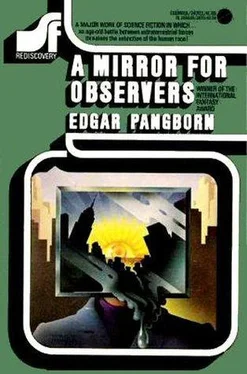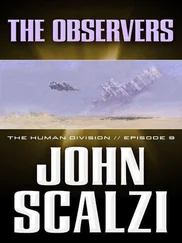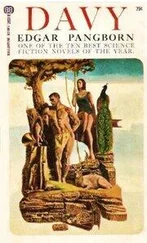“Ah, yah….” He shook the boy, not roughly but slowly. Angelo swayed at the end of his arm, and spat blood from a cut lip. “Jesus, kid! But you was always a good boy — never in no trouble before, what the hell?”
Angelo asked quietly: “Is that true? I don’t exactly know.”
“Huh? You never done nothing like this before.”
“I have,” said Angelo drowsily, and his head drooped and I could scarcely hear him. “Yes, I have, in my dreams. They come like clouds. Which is the sky: the clouds or the blue?”
“Now, boy, now. What kind of an answer is that? You’re high-sterical is what it is. Pull yourself together. You see that ambulance? You see what’s going into it, huh, Angelo?”
“Take him home, Dunn. Take him home.”
“They all go to the station, mister. But you could be right. I won’t book him, maybe. I’ll get him home. Understand, Angelo? A break. On your mother’s account, not on yours, believe you me. And if there’s ever a second time, no break, no break at all. Now come on—”
“Ben! Ben — ask them to clean me up before they—”
“In with you. In with you now….”
Those women had given Sharon a sleeping pill. (It is increasingly a sleeping-pill culture, Drozma. Seventeen years ago I don’t think a respectable woman in a poor district would have had a supply of barbiturates, much less given one casually to a child without even a doctor’s word. It could be a small symptom of the many forces that may make fools of us and our hope of Union within five hundred years or so. Yet I don’t blame them too much. Life in its growing complexity nags and bedevils them: rather than learn the uses of simplicity, they reach for sleep.) I carried Sharon to my car, and home, cutting short the startled mooings of her parents with some ill-tempered noise of my own. It wasn’t their fault, in a way — to make her frantic effort, Sharon had slid down the rain-spout when they supposed she was in bed. It was another playmate, a seceding Mudhawk, who had let slip word to Sharon of what was planned. So Sharon told me a day or two later. I must finish this report quickly, Drozma.
Namir as Feuermann had not returned to No. 21. I did not think he would. (As I write this, the body of Feuermann has not been found. There was an item about “mysterious summer lightning” destroying a tree in Byfield; the damage done by the falling top may have canceled out the marks of the shallow grave. If the old man is ever found, I suppose his motiveless murder will become a popular mystery to addle the experts.)
No. 21 was gently quiet. I found Rosa sewing in her basement living room, unconcerned, mild, too far from the war in Quire Lane to have heard its crying, comfortable in the belief that Angelo was asleep in his room with a bit of a cold. It was too much for me. I don’t understand either the strength or the fragility of human beings, as I see them sometimes bending viably before enormous pressures, sometimes snapping at a touch.
Rosa knew from my face that something was wrong. She put her sewing away and came to me. “What is it, Ben? You sick?” Still unhurt, still safe behind her unreal shield of love and security — the house quiet, Angelo surely in his room — she could be sorry for me, and anxious to help. “What is the matter, Ben? You look awful.”
So I gabbled. “Nothing serious, but—”
I might have succeeded somehow in preparing her for it. I don’t know. I was hopelessly human in my stammering hunt for words that might warn without wounding. While I stammered, Dunn came in. Through the basement door, without ringing, holding Angelo by the arm. Yes, they’d tried to clean him up a little, but couldn’t hide the cut lip or the gash over his eye. They’d washed his face, but couldn’t wash away the shame, the glaze of withdrawal, the agony.
I saw Rosa’s hand leave her wobbling lips and clutch at her left arm. I could not reach her, nor could Dunn, in time to check her fall.
There was no rising. Only the choking, the brief struggle, and the relinquishment. Even after her face turned cyanotic I think she was still trying to see where Angelo was, or perhaps say something to him — that it was all right, not his fault, something like that….
“May I go and get Father Ryan?”
That blank whisper made Dunn remember him and turn to him. “Why — she’s gone, boy. She’s gone.”
“Yes, I see, I know. I did that. May I go and get Father Ryan?”
“Of course.”
He never returned, Drozma. The priest came quickly, but Angelo was not with him. Father Ryan said Angelo had run on ahead of him.
In the week since then, the Latimer and state police have done everything possible. There is an eight-state alarm, everything else that human intelligence can devise. They are looking for Feuermann too, the worthless rumors like the haze that hangs on after forest fire. Since it seems that he ran into night, and night took him, I will go into night myself, and look for him there.
A word about Sharon. I saw her last in Amagoya, but she knew its magic had perished, as well as I knew it, and it was unavoidable that we should talk like grownups. I told her that of course Angelo would be found, or more likely come back by himself when he could. I told her that I was going away alone to look for him. It was hard for her to accept the obvious fact that she could not come with me. She did accept it. I have never been so dangerously close to revealing what we must not, as I was there in Amagoya when she said: “You know everything, Ben. You will find him.” So I know everything! She was a woman, Drozma. Even her mangled big words weren’t funny, they weren’t funny at all. I made her promise to do what she already knew she must — stay, stay with her music, grow up, “be a good girl” — we found we could laugh some at that last, nevertheless knowing what it meant.
If I end this here, I have time to make myself a passable new face before dawn. As soon as there has been time for this report to have reached you I will call through the Toronto Communicator and learn your orders.
Whatever they are, I cannot return to Northern City if it means abandoning this mission. I will yield no such victory to Namir and his kind. We are a little less than human, Drozma, and a little more.
In our barbarous society the influence of character is in its infancy.
— RALPH WALDO EMERSON,
Politics
New York City Wednesday, March 8, 30,972
Drozma, tonight I am racked by an old malady, a love for the human race.
I have searched more than nine years. As you know from my reports, I have not found him. If living, Angelo is twenty-one. You have been kind, to support me with money and counsel. With the Russo-Chinese War reeling into a third dreary year and the rest of the world in a frenzy of indecision, I know you cannot spare other personnel to aid me, but I must go on searching. I will send this journal later in place of a formal report. A few hours ago something happened which will be a pleasure to record, but otherwise I have little to tell: frustrations, false clues, dead-end journeys. I have come here to New York and taken an apartment, because of a newspaper photograph that made me think of Billy Kell.
It was a picture of that fellow Joseph Max being interviewed by some journalist. Behind Max was a face alertly blank like a bodyguard’s, enough like Kell to excite my wondering. Namir (and his son?) may have been searching for Angelo as persistently as I. In the nine years I have had no more hint of their whereabouts than of his. I was in Cincinnati when I saw the picture a week ago. I had gone there because one of my hobo friends slipped word to me that someone resembling my “grandson” was hanging around the river docks. Nothing in it. One more dark-haired bum with a limp; a face like a woodchuck. The world’s full of dark young men with lame left legs. The tramps and prostitutes and petty criminals who try to help me are not people who know how to describe a face. When I make contact with them I am a crazy old coot hunting a grandson who might have died long ago or (they think) never lived. They try to be kind, supplying rumors to keep the old man going, partly for laughs. I have no good reason to suppose that Angelo sank into the shadows of the underworld: it’s only that those shadows are easier to explore than the endless multitudes of the respectable. Quite possibly some decent family gave him shelter and another name. I go on. I can’t mingle in any crowd without sooner or later seeing some dark youth with a limp. Once I saw one who not only resembled Angelo but had a scar over the right eye, as Angelo must have. That was on the copter-bus from Sacramento to Oakland. I trailed him home, watched him a few more times, made inquiries in the neighborhood. Nice kid, not even Italian, lived in Oakland all his life. Some hopes won’t die.
Читать дальше












